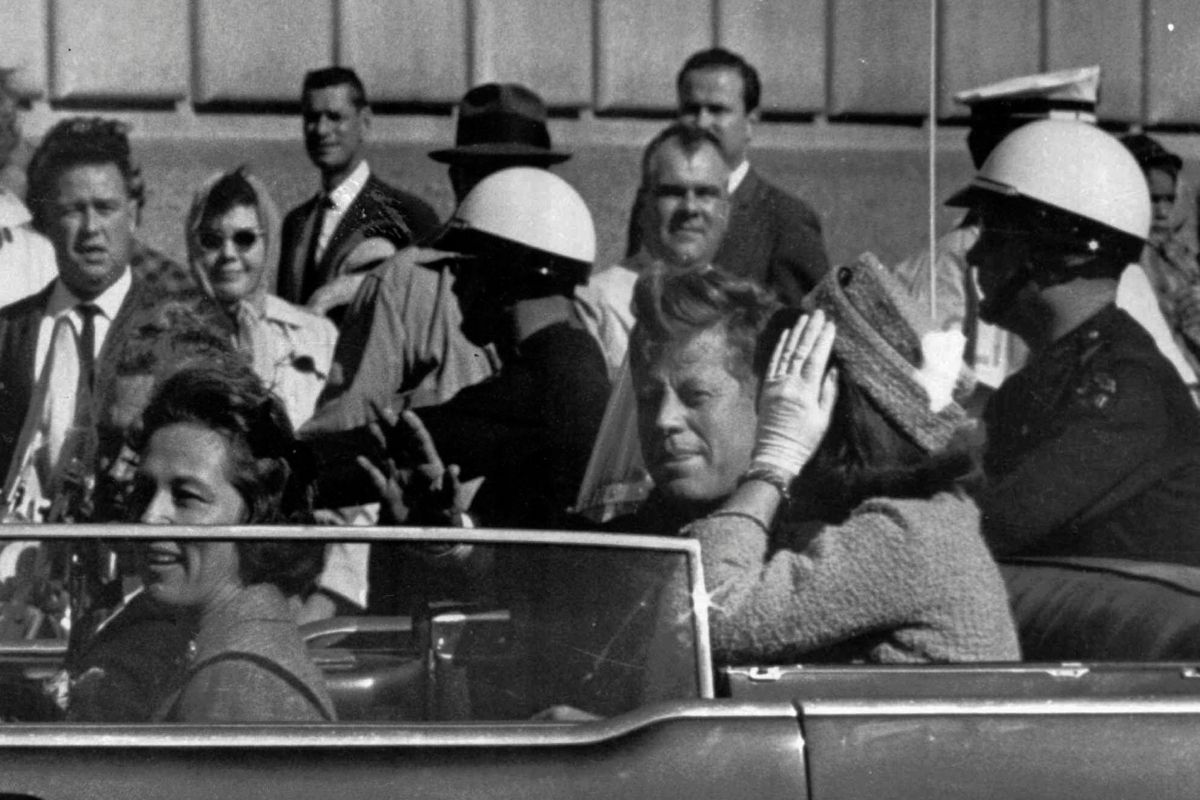Madeleine Duncan Brown, who died in 2002, claimed to be the longtime mistress of President Lyndon Baines Johnson. Brown detailed the affair in her Conservatory Press memoir, Texas in the Morning: The Love Story of Madeleine Brown, and insisted that her son Steven Mark Brown was a product of this relationship. But that’s far from her most interesting claim. During an interview conducted by Robert Gaylon Ross, Sr. shortly before Brown’s death, she detailed her former lover’s foreknowledge of the assassination of President John F. Kennedy.
Videos by Rare
The Life of Madeleine Duncan Brown
Madeleine Brown (née Duncan) grew up in Dallas, Texas, and attended W. H. Adamson High School. When she was 19, she married her childhood sweetheart James Glynn Brown but the marriage fell apart following his service in the United States Marine Corps. Returning home from the war, Brown was abusive, schizophrenic, and eventually institutionalized. Although the couple did not officially divorce until 1955, they split in 1948 when their son Jimmy was just two months old. Around the same time, Madeleine was hired by Glenn Advertising and it was the field of radio advertising which eventually led her to cross paths with Lyndon B. Johnson.
Madeleine Brown met Lyndon B. Johnson back in 1948 when the politician was still a Texas congressman. Their tryst began at the Adolphus Hotel, following a party, and continued on for nearly 20 years. Brown came clean about the affair at a press conference in 1982 after The Dallas Morning News ran a story about the couple. Five years later, Brown’s younger son Steven Mark Brown filed a $10.5 million lawsuit against Lady Bird Johnson, alleging that he was biologically Johnson’s son and that the former first lady had conspired to deprive him of his inheritance. One of Johnson’s associates, attorney Jerome T. Ragsdale, even claimed the baby as his own to prevent the bad publicity.
Steven Brown’s suit was dismissed after he failed to show in court. The reason why is especially suspicious. The veteran was arrested and detained by the Navy, suddenly, for “deserting” his post. (Brown was suffering from cancer at the time, and presumably had left his post formally prior to 1989.) He remained missing for two months, and the $10 million lawsuit was thrown out. In 1990, Steven Brown died at age 39, from lymphatic cancer. The disease runs in Johnson’s family. Madeleine Brown touched on the lawsuit, and her son’s premature death, in a tell-all interview with the author Robert Gaylon Ross, Sr. in the year 2000. And that’s not all that Brown had to comment on.
Allegations Regarding the JFK Assassination
“We had a beautiful relationship,” Madeleine Brown said of Lyndon B. Johnson when speaking to Robert Gaylon Ross, Sr. But the interviewer is primarily concerned with JFK’s assassination, specifically how it relates to the mysterious “Clint Murchison Meeting,” as it’s come to be called. The meeting occurred the night before Lee Harvey Oswald shot the president and included such powerful figures as including J. Edgar Hoover, Richard Nixon, John McCloy, H. L. Hunt, and of course, Vice President Lyndon B. Johnson. Clint Murchison was a rich oil tycoon who’d closely supported Johnson during the 1960 Democratic primary. Ross has published various books on related conspiracy theories and the Clint Murchison meeting is of vital importance to understanding the extent of foul play surrounding the Kennedy assassination.
Madeleine Brown first spoke publicly on the matter in 1992, in a television interview for A Current Affair. Brown said that on the evening of November 21, 1963 — the night before the assassination — she went to a party near Dallas at one of Clint Murchison’s houses. When Lyndon B. Johnson finally arrived, she said:
“Tension filled the room… The group immediately went behind closed doors. A short time later Lyndon, anxious and red-faced, re-appeared. I knew how secretly Lyndon operated. Therefore I said nothing… not even that I was happy to see him. Squeezing my hand so hard, it felt crushed from the pressure, he spoke with a grating whisper, a quiet growl, into my ear, not a love message, but one I’ll always remember: ‘After tomorrow those goddamn Kennedys will never embarrass me again – that’s no threat – that’s a promise.'”
Madeleine Brown echoed those sharp details during the subsequent interview with Robert Gaylon Ross. Again, she displays subtle attention to the dynamics of LBJ’s blustering behavior. Despite the many decades that have passed, Brown seems clearly lucid and exhibits a persistent social awareness of her former acquaintances. Suffice to say, Brown was not clueless. In fact, she was politically inclined and closely recognized the many businessmen and politicians fraternizing around her. And noted their intent. On the night of November 21, 1963, the party at Clint Murchison’s house was thrown in honor of J. Edgar Hoover, the director of the FBI. According to Philip F. Nelson’s LBJ: The Mastermind of the JFK Assassination, this party premise allowed for a number of seemingly unrelated figures to convene so soon before the planned assassination without raising suspicion. Then, the final decision was made behind closed doors to move forward with the diabolical plan.
Lyndon B. Johnson, who’d spent the day traveling between Houston and Fort Worth nearly missed the event. But in the end, he arrived to Clint Murchison’s residence, late, by limousine realizing his presidential destiny would be confirmed. Madeleine Brown described the vice president’s nearly giddy state when he left the meeting, saying, “those SOBs” would never mess with him again. The next day, John F. Kennedy was shot dead by Lee Harvey Oswald while driving in a motorcade through Dealey Plaza in Dallas, Texas. Two days later, Oswald was killed by Jack Ruby while in police custody. That same day, H.L. Hunt told Brown: “Well, we’ve won the war,” a continuation of a remark made during 1960 Democratic Convention, when Hunt Hunt said that they might have lost a battle — referring to Johnson’s primary loss — but they’d win the war.
Madeleine Brown died two years after her extensive conversation with Robert Gaylon Ross, Sr. She was 76 years old. Although her claims have been challenged, most notably by conspiracy debunker Gary Mack, her account remains a historic, informative, and colorful background to our understanding of both the Kennedy and Johnson presidencies. (And Nixon’s too, for that matter.) After her death, interview clips with Brown also factored into the ITV documentary series, The Men Who Killed Kennedy.



